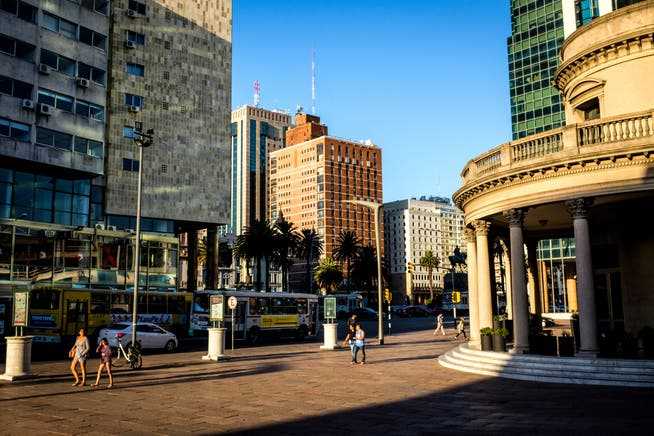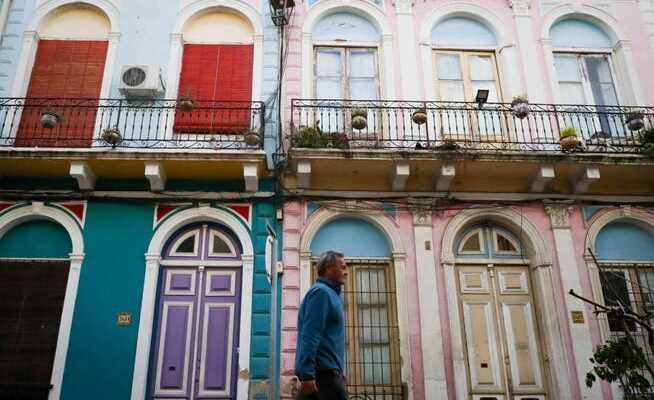Uruguay shines in the shadow of its big neighbors Brazil and Argentina with stable political conditions. Now the Ukraine conflict and the energy transition are also enhancing the country’s geostrategic status.
With the charm of a South American metropolis from 50 years ago: the center of Montevideo.
As soon as you arrive in Montevideo, it becomes clear that you are stepping into a different South America: there are no crowds, no queues at immigration or customs at the elegant airport in the suburb of Carrasco. The drive to the city center, 20 kilometers away, along the Atlantic coast is quiet, without traffic jams. Compared to chaotic, congested São Paulo or Buenos Aires, it feels like you’re in a spa town – despite the 1.8 million people who live here.
Unlike in most of South America’s megacities, there are few glittering office or residential towers here. Even the business districts are constantly being replaced by neighborhoods with houses or smaller residential and commercial buildings. The center around the port and the old town have been restored in some parts. The latter is partly in need of renovation and, with its general stores, exudes a charm of 50 years ago. It is symptomatic that it proudly points out that the magazine “Reader’s Digest” – which is past its best – has classified Uruguay as the most livable and greenest country in North and South America.
Two thirds of the population are middle class
This impression of conservative mediocrity is also reflected in the statistics: Unlike most Latin American societies, Uruguay not only has the super-rich alongside a narrow middle class and a large number of poor people. Two thirds of the 3.6 million Uruguayans belong to the middle class. There are few people living below the poverty line. The rich-poor gap is the smallest in Latin America. Per capita income is the highest in the region at $17,000 a year.
In the streets of Montevideo there are no luxury cars like in the metropolises of the neighboring countries, where the rich like to flaunt their wealth. In general, like in Switzerland, discretion and a “low profile” are valued. So it can happen that the national football star Diego Forlán sits in a café undisturbed by the other guests – that would be completely unthinkable with a Neymar in Brazil.
One wonders how this small country for South America – half the size of Germany, with just under half the population of Switzerland – in the direct vicinity of such large and politically divided countries as Brazil and Argentina, manages to be socially and economically successful be. How did this country manage to isolate and stand out from neighboring countries, despite sharing a similar society, history and geography?
Populists have no chance
Politics provides an answer. Uruguay is one of the most stable democracies in the world. On the Democracy Index of the Economist Intelligence Unit (EIU), Uruguay ranks 13th, three places behind Switzerland and two ahead of Germany. It is therefore the only full-fledged democracy in South America, a continent for which the EIU has recorded a steady decline in the quality of the democracies for several years. According to the EIU, Uruguay is going against the regional trend. The country has been improving its democracy as one of the few countries in the world for more than 15 years. On the Transparency Corruption Index, Uruguay ranks 18th out of 180 countries, the only one in Latin America, two places ahead of France.

At the Plaza Independencia there is a wild mix of the architectural styles of the last century.
The political scientist Sebastian Grundberger from the Konrad-Adenauer-Foundation in Uruguay sees a high social consensus in contrast to the rest of Latin America, the most stable party system in the region with stronger democratic defenses than in the neighboring countries. Populists have no chance here, says Grundberger.
A referendum at the end of March showed just how smoothly politics works in Uruguay. The Uruguayans voted on whether 135 of a total of 476 articles of the law should become invalid. These were part of a legislative package that the right-centre government of President Luis Lacalle Pou passed in Congress shortly after taking office in 2020. Central were the issues of security and education, where the central government wants to take more action. In addition, the power of the trade unions is to be limited and the dominance of the state monopolies, for example in the case of Telekom, is to be reduced.
Despite differences of opinion, not a divided society
The influential trade union umbrella organization had mobilized against this. But unlike in neighboring countries, there were no angry protests or even violent clashes in the run-up to the referendum. On voting Sunday, too, families went for walks along the Rambla – Montevideo’s waterfront street – equipped with gourds (drinking vessels made of pumpkin skins) and thermos flasks to drink their mate tea.
The fact that the government was able to prevail by a razor-thin margin and the laws remain valid can be explained primarily by the president’s popularity. The 49-year-old lawyer Lacalle Pou comes from a political family that has shaped Uruguay’s politics since the beginning of the last century. His father was president from 1990 to 1995. But Lacalle Pou only entered politics at the age of almost 30. He has long had the reputation of a surfing sunny boy; he only managed to be elected with a narrow majority at the second attempt in 2019.

President Luis Lacalle Pou is popular because of his crisis management in the pandemic. The conservative lawyer comes from a traditional political dynasty. Here on a state visit to Paraguay.
Above all, his level-headed pandemic management made Pou popular: he repeatedly demanded freedom with responsibility from the citizens. There was never a lockdown. At times, homeschooling was prescribed. The country already had good broadband coverage and an established digital education infrastructure. Bars and restaurants only had to close at midnight. Uruguay quickly became the country with the most vaccinated people in Latin America after Chile. Halfway through his term in office, 52 percent of the population gave Lacalle Pou a positive rating – the highest level of popularity for a president in a long time. Pou is also helped by the fact that the economy is growing again after several years of stagnation.
Soon the only conservatively governed country in South America?
For the president, the referendum is like winning midterm elections. It’s quite possible that by the end of the year Pou will be the only conservative head of state in South America alongside the presidents of Ecuador and Paraguay. Political scientist Grundberger says that in a region that is drifting politically to the left, it is increasingly becoming a point of reference for bourgeois forces.
This also applies to companies in South America. This attracts the stability of Uruguay. In recent years, numerous entrepreneurs have come across the Río de la Plata, especially from Argentina. For example Marcos Galperín, the founder of Mercado Libre, the most successful Internet platform in Latin America, with the entire management team. Venancio Trigo, a lawyer at the commercial law firm Gujer & Regules in Montevideo, reports that retailers from Chile are now also considering moving their headquarters to Uruguay. In Chile, entrepreneurs are unsettled by the increasing trend towards the left in politics.
It will now be exciting what Pou will do with the confirmation in office in his remaining two years. Reforms of the pension system and education are on the agenda. The school system is particularly sluggish: 40 percent of students do not complete school. Outdated curricula and a staffing policy for teachers in which unions fill vacancies on a seniority basis are said to be the main reasons.
Software as an important export product
It’s a ticking time bomb for Uruguay. The country exports a record amount of software per capita. It has become an important startup location in the region. The fintech company dLocal from Uruguay is now worth around ten billion dollars on Wall Street. The delivery service PedidosYa has now been taken over by Delivery Hero from Germany. But there is an increasing shortage of engineers and programmers. “Uruguay could be the Estonia of South America with its advanced digitization,” says Mischa Groh, Managing Director of the German-Uruguayan Chamber of Commerce and Industry.
The economist Augustin Iturralde hopes for further reforms for the economy. The director of the Centro de Estudios para el Desarrollo, a liberal economics institute, is more critical than most of the interviewees when it comes to the issue of competitiveness. Institutionally, Uruguay is a highly developed democracy. But in business, mediocrity rules. When it comes to doing business, i.e. entrepreneurial friendliness, the country is lagging behind. State monopolies at Telekom would be tolerated. Uruguay is therefore an expensive location. Productivity must increase, otherwise Uruguay will lose its attractiveness. “We are a small country,” says Iturralde. “We have to offer more than that.”
97 percent of the electricity is generated sustainably
But Uruguay could be lucky. The global energy transition and geopolitical shifts favor the country on the Río de la Plata. On the one hand, Uruguay has transformed its electricity system into one of the most sustainable in the world with massive investments in wind farms in ten years. Since then, wind turbines have been turning on the hills in the deserted interior of the country. The country now produces 97 percent of its electricity sustainably without releasing carbon dioxide. However, this also means that Uruguay could quickly become a strategically important supplier of green hydrogen – as a substitute for oil, coal and gas as energy sources.

Mainly because of its wind farms, Uruguay produces 97 percent of its electricity sustainably without releasing carbon dioxide.
The German industrial engineer Aram Sander, who has already set up wind farms in Uruguay and put them into operation, says: “With the Ukraine conflict, completely new arguments are coming up with the question of security of supply.”
Trust is one of them. There is no country in the region that fulfills its contracts so reliably, says Sander, who is now pushing hydrogen projects worldwide for the German company Enertrag. The high level of confidence in Uruguay is measured by the low interest rates. In South America, only Chile has a better credit rating. Development banks would be happy to give Uruguay credit. Sander is certain: “Uruguay could quickly deliver a relevant replacement for Russian natural gas.”
Another indication of the stability Uruguay is known for among investors is the growing interest in Uruguay from family offices, i.e. wealthy asset managers from Germany, Austria and Switzerland, observes the financial advisor Thomas Lagemann from Hamburg. They weren’t looking for weekend homes in the fashionable holiday resort of Punta del Este, says Lagemann, who grew up in Uruguay. They wanted to invest professionally in farms and estates.
